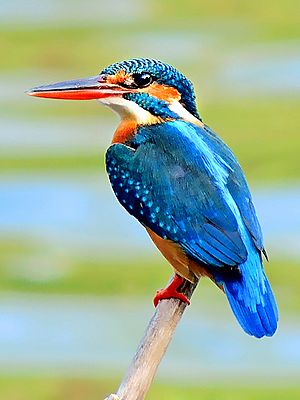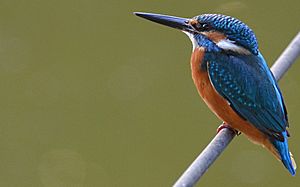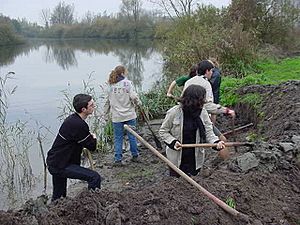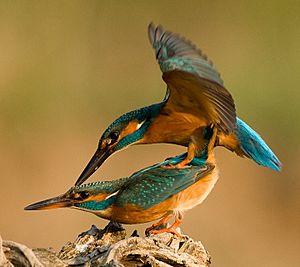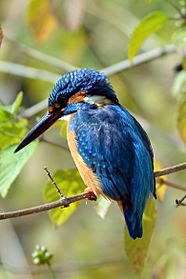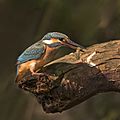Common kingfisher facts for kids
Quick facts for kids Common kingfisher |
|
|---|---|
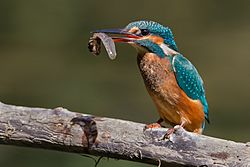 |
|
| A kingfisher capturing a tadpole | |
| Conservation status | |
| Scientific classification | |
| Kingdom: | |
| Phylum: | |
| Class: | |
| Order: | |
| Family: | |
| Genus: |
Alcedo
|
| Binomial name | |
| Alcedo atthis |
|
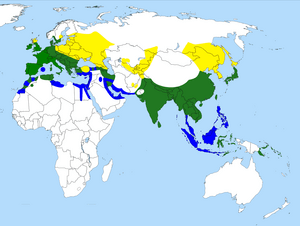 |
|
|
Breeding range
Resident all year-round Non-breeding range |
|
The common kingfisher (Alcedo atthis) is a small, colorful bird. It's also called the Eurasian kingfisher or river kingfisher. These birds live across Eurasia and North Africa. They usually stay in one place all year. But some kingfishers move to warmer areas when rivers freeze in winter.
This bird is about the size of a house sparrow. It has a short tail, a large head, and a long beak. Its back is bright blue, and its belly is orange. Kingfishers mainly eat fish. They catch fish by diving into the water. They have special eyes that help them see underwater. Kingfishers lay shiny white eggs in nests they dig into riverbanks.
Contents
What Does a Common Kingfisher Look Like?
The common kingfisher has a unique shape. It has a short tail, a plump body, a large head, and a long beak. Adult males in western Europe have green-blue backs. Their lower backs and rumps are pale blue. They have an orange patch near their beak and an orange ear-patch. They also have a green-blue stripe on their neck. Their throat and a patch on their neck are white. Their belly is orange. Their beak is black with some red at the bottom. Their legs and feet are bright red.
- Size: They are about 16 centimetres (6.3 in) (6 inches) long.
- Wingspan: Their wings spread about 25 cm (9.8 in) (10 inches) wide.
- Weight: They weigh between 34–46 grams (1.2–1.6 oz) (1.2-1.6 ounces).
Female kingfishers look just like males. The only difference is that the female's lower beak is orange-red with a black tip. Young kingfishers look similar to adults. But their blue parts are duller and greener. Their orange parts are paler. Their beak is all black, and their legs are black at first.
How Do Kingfishers Fly?
Kingfishers fly very fast and straight. They usually fly low over the water. Their short, rounded wings beat quickly. When a kingfisher flies away, you can see a bright blue "flash" on its back.
How to Identify a Kingfisher
In North Africa, Europe, and Asia (north of the Himalayas), the common kingfisher is the only small blue kingfisher. In south and southeast Asia, there are other similar blue-and-orange kingfishers. But the common kingfisher has orange ear patches. This helps tell it apart from most others.
What Sounds Do Kingfishers Make?
The common kingfisher does not sing. Its flight call is a short, sharp whistle, like chee. It repeats this two or three times. If a kingfisher is worried, it makes a harsh sound, shrit-it-it. Baby kingfishers make a churring noise when they want food.
Where Do Common Kingfishers Live?
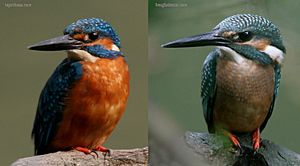
Common kingfishers live across Europe, Asia, and North Africa. They are common in most of their range. In North Africa, they mostly visit in winter. But some do live and breed there.
Kingfisher Habitats
In cooler areas, kingfishers live near clear, slow-moving streams, rivers, and lakes. These places have lots of plants along the banks. They like bushes and trees that hang over shallow water where they hunt. In winter, they move closer to the coast. They often feed in estuaries (where rivers meet the sea) or harbors. They also hunt along rocky seashores. In tropical areas, they live by slow rivers, in mangrove swamps, and other wet areas.
Kingfishers are important for healthy freshwater environments. If you see kingfishers, it often means the water is clean. They need clear water to see their prey. They also need trees or bushes along the banks. When riverbanks are changed by humans, it can harm the kingfisher's home. This can reduce the number of fish and other animals they eat. Kingfishers can live in cities if the water stays clean.
Do Kingfishers Migrate?
Kingfishers stay in places where the weather is mild all year. But if winters are very cold and rivers freeze, they have to migrate. Most kingfishers spend winter in the southern parts of their breeding areas. Some fly across the Mediterranean Sea to Africa. Others travel over mountains in Malaysia to Southeast Asia. Kingfishers mostly migrate at night. Some birds from Siberia travel at least 3,000 km (1,900 mi) (1,860 miles) to their winter homes.
Kingfisher Behavior and Life
Kingfisher Territory
Common kingfishers are very protective of their territory. They need to eat about 60% of their body weight every day. So, having a good stretch of river is very important. They usually live alone for most of the year. They sleep alone in thick bushes. If another kingfisher enters their area, they will show off from their perches. Sometimes, they even fight. They might grab each other's beaks and try to hold the other underwater.
Pairs form in the autumn. But each bird keeps its own territory. This territory is usually at least 1 km (0.62 mi) (0.6 miles) long. It can be up to 3.5 km (2.2 mi) (2.2 miles) long. They only combine their territories in the spring.
How Do Kingfishers Nest?
Kingfishers dig their nests in low, vertical riverbanks. Sometimes they use quarries or other cuttings. Both the male and female dig the burrow. The burrow is straight and slopes gently upwards. It is usually 60–90 cm (24–35 in) (2-3 feet) long. It ends in a larger chamber. The nest itself is not lined with anything. But it quickly fills with fish bones and other leftovers.
A common kingfisher usually lays two to ten shiny white eggs. Each egg is about 1.9 cm (0.75 in) (0.75 inches) wide and 2.2 cm (0.87 in) (0.87 inches) long. They weigh about 4.3 g (0.15 oz) (0.15 ounces). Sometimes, one or two eggs don't hatch. This happens if the parent can't cover them all. Both parents take turns sitting on the eggs during the day. Only the female sits on them at night.
The eggs hatch in 19–20 days. The baby birds stay in the nest for another 24–25 days, sometimes longer. When they are big enough, the young birds come to the burrow entrance to be fed. Kingfishers can raise two, and sometimes even three, groups of babies in one season.
Kingfisher Survival
The first few days after leaving the nest are dangerous for young kingfishers. When they first dive into the water, about four days after leaving the nest, they might get too wet and drown. Many young birds don't learn to fish well before their parents make them leave the territory. Only about half of them survive more than a week or two.
Most kingfishers die from cold or not enough food. A very cold winter can kill many birds. Summer floods can destroy nests. Floods also make it hard to find fish, which can cause the babies to starve. Only about a quarter of young kingfishers live long enough to breed the next year. But this is enough to keep the population stable. Similarly, only a quarter of adult birds survive from one breeding season to the next. Very few kingfishers live longer than one breeding season. The oldest kingfisher ever recorded lived for 21 years.
Other dangers for kingfishers include:
- Cats and rats
- Crashing into cars and windows
- People disturbing their nests, especially with heavy machines near rivers.
Kingfishers are at the top of their food chain. This means they can be harmed by pollution in rivers. Chemicals from industries and farms can make rivers unsafe for them. This forces kingfishers to leave areas that would otherwise be good homes.
In the past, people used to kill kingfishers. They would stuff them for display or use their feathers for hats. Some people even believed that hanging a dead kingfisher by a thread would show which way the wind would blow. Anglers (people who fish) also used to hunt them. They would use their feathers for fishing lures. Luckily, these practices are mostly a thing of the past now.
How Do Kingfishers Hunt?
The common kingfisher hunts from a perch. This is usually a branch, post, or riverbank about 1–2 m (3.3–6.6 ft) (3-6 feet) above the water. It points its beak down, looking for prey. When it spots food, it bobs its head. This helps it figure out the distance. Then, it plunges steeply into the water. It usually catches prey no deeper than 25 cm (9.8 in) (10 inches) below the surface.
Underwater, the kingfisher opens its wings. Its eyes are protected by a clear third eyelid. The bird rises beak-first from the water. Then it flies back to its perch. On the perch, it adjusts the fish until it holds it by the tail. It then bangs the fish against the perch several times to kill it. Once the fish is dead, the kingfisher turns it lengthwise and swallows it head-first. A few times a day, the kingfisher spits out a small grey pellet. This pellet contains fish bones and other parts it can't digest.
What Do Kingfishers Eat?
Kingfishers mainly eat fish up to 12.5 cm (4.9 in) (5 inches) long. But the average fish they catch is about 2.3 cm (0.91 in) (1 inch). Common prey include minnows, sticklebacks, small roach, and trout. About 60% of their diet is fish.
But kingfishers also catch other things:
- Aquatic insects like dragonfly larvae and water beetles.
- In winter, they eat crustaceans, like freshwater shrimps.
Kingfisher Eyesight
It's tricky for a diving bird to see clearly both in air and underwater. The way light bends changes when it goes from air to water. Many birds have two special spots in their eyes called foveae. These spots have the most light receptors. A kingfisher can switch between its main fovea and a second one when it dives into water. This helps it keep its vision sharp underwater.
Because of how their eyes are set up, kingfishers see with one eye (monocular vision) in the air. But they see with both eyes (binocular vision) underwater. Their underwater vision isn't as sharp as in the air. But it's more important for them to judge the distance of moving prey than to have a super clear image.
Bird eyes also have oil droplets in their cone cells. These droplets contain pigments that help with color vision and reduce glare. Aquatic kingfishers have many red pigments in their oil droplets. Scientists don't fully understand why red droplets are common. But they might help with glare or with light scattering from particles in the water.
How Are Kingfisher Populations Doing?
The common kingfisher lives in a very large area. This area is estimated to be 10 million square kilometers (3.8 million square miles) worldwide. It also has a large population. In Europe alone, there are an estimated 160,000–320,000 kingfishers.
Scientists haven't measured global population trends exactly. But the number of kingfishers seems to be stable. This means their population is not decreasing quickly. Because of this, the species is considered to be of "least concern" by conservation groups. This means they are not currently at risk of disappearing.
Images for kids
-
The common kingfisher hunting in Italy's Po River.
-
An A. a. ispida female with a dragonfly larva in Hungary.
-
An A. a. bengalensis with a fish in Uttar Pradesh, India.
See also
 In Spanish: Martín pescador común para niños
In Spanish: Martín pescador común para niños
 | Victor J. Glover |
 | Yvonne Cagle |
 | Jeanette Epps |
 | Bernard A. Harris Jr. |



